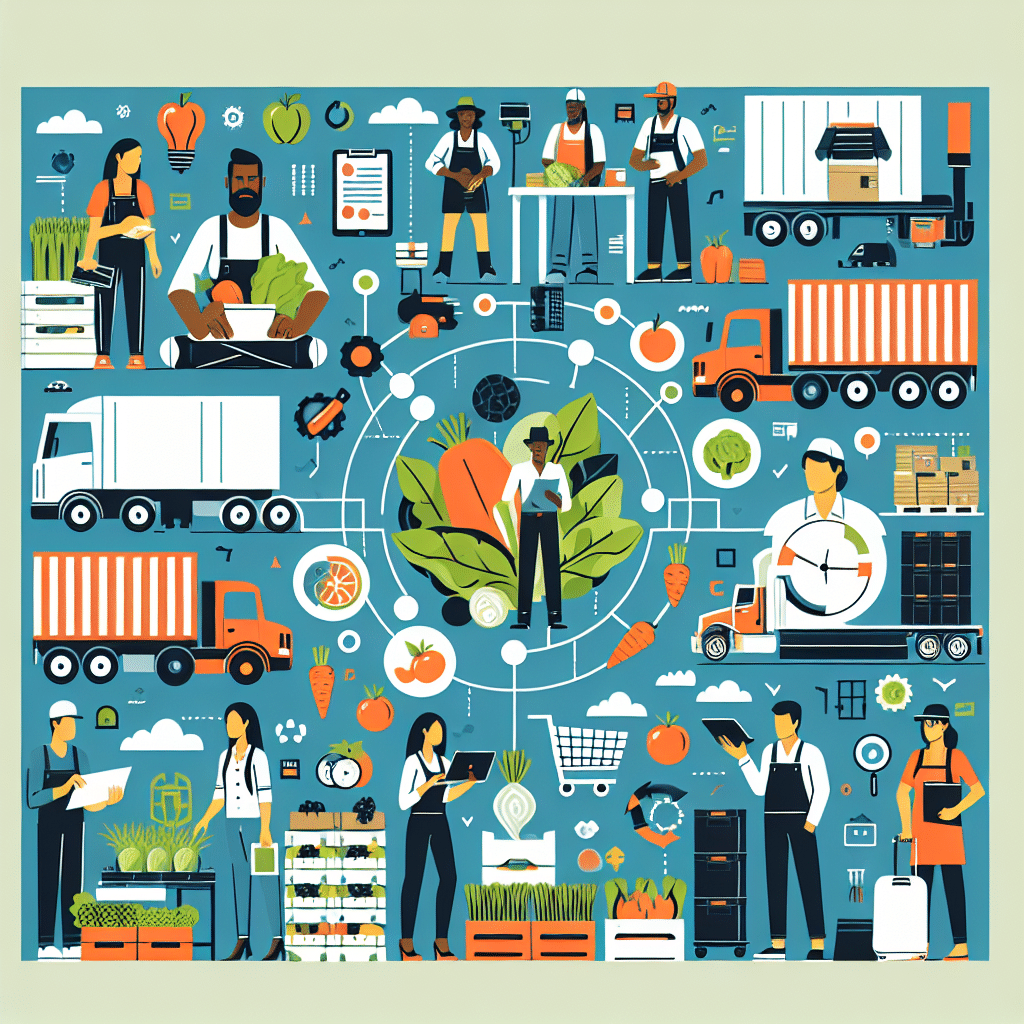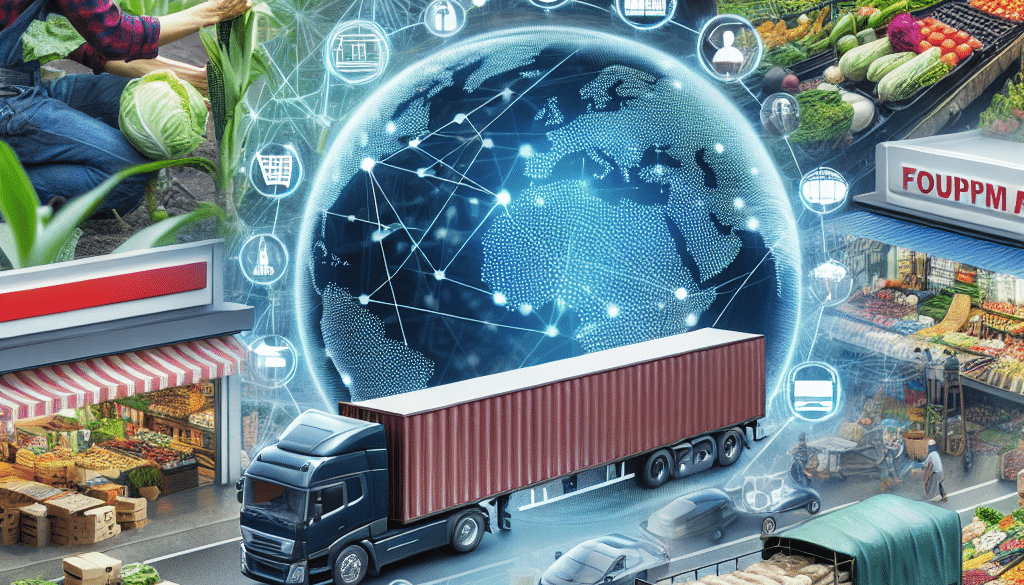Coping with Food Supply Chain Complexities
-
Table of Contents
- Coping with Food Supply Chain Complexities: Strategies and Solutions
- Understanding the Food Supply Chain
- Challenges in the Food Supply Chain
- Strategies for Coping with Supply Chain Complexities
- Enhancing Supply Chain Visibility
- Diversifying Supply Sources
- Building Resilient Infrastructure
- Adopting Flexible Business Models
- Investing in Workforce Development
- Conclusion
- ETprotein: Your Partner in Nutritional Excellence
Coping with Food Supply Chain Complexities: Strategies and Solutions

The global food supply chain is a vast and intricate network that involves the production, processing, transportation, and distribution of food products. It is a system that is essential for feeding the world’s population but is also fraught with complexities and challenges. From climate change and natural disasters to political unrest and pandemics, the food supply chain faces numerous threats that can disrupt its smooth operation. In this article, we will explore the complexities of the food supply chain and discuss strategies for coping with these challenges.
Understanding the Food Supply Chain
The food supply chain consists of several key stages:
- Production: This involves the growing of crops and the raising of livestock.
- Processing: This stage transforms raw agricultural products into food products.
- Distribution: This includes warehousing, transportation, and logistics to move food from producers to consumers.
- Retail: Supermarkets, grocery stores, and markets where consumers purchase food.
- Consumption: The end-user or consumer who eats the food.
Each of these stages is interconnected and dependent on the others, making the food supply chain a complex system that requires careful management and coordination.
Challenges in the Food Supply Chain
The food supply chain faces a variety of challenges that can lead to disruptions:
- Climate Change: Extreme weather events such as droughts, floods, and hurricanes can destroy crops and disrupt production.
- Pests and Diseases: Outbreaks can decimate crops and livestock, leading to shortages and increased prices.
- Political Instability: Wars and political unrest can block transportation routes and hinder trade.
- Economic Factors: Fluctuations in currency values, tariffs, and trade agreements can affect the cost and availability of food.
- Pandemics: Diseases like COVID-19 can disrupt labor forces, close processing facilities, and alter consumer demand.
These challenges highlight the need for robust strategies to ensure the resilience of the food supply chain.
Strategies for Coping with Supply Chain Complexities
To cope with the complexities of the food supply chain, stakeholders must implement a range of strategies:
Enhancing Supply Chain Visibility
Improving transparency throughout the supply chain is crucial for identifying potential issues before they become crises. This can be achieved through:
- Implementing tracking and tracing technologies.
- Adopting blockchain for secure and transparent record-keeping.
- Using big data analytics to predict and mitigate risks.
Diversifying Supply Sources
Relying on a single source for food products can be risky. Diversification strategies include:
- Developing relationships with multiple suppliers.
- Investing in local and regional food systems to reduce dependency on global markets.
- Encouraging sustainable farming practices to ensure a steady supply of diverse crops.
Building Resilient Infrastructure
Infrastructure is the backbone of the food supply chain. To strengthen it, stakeholders should:
- Invest in robust transportation networks that can withstand extreme weather.
- Upgrade storage facilities to better preserve food quality and reduce waste.
- Implement renewable energy sources to reduce the impact of power outages.
Adopting Flexible Business Models
Flexibility allows businesses to adapt to changing conditions. This can involve:
- Utilizing just-in-time inventory systems to reduce stockpiling and waste.
- Exploring alternative distribution channels, such as direct-to-consumer models.
- Adjusting product offerings in response to shifts in consumer demand.
Investing in Workforce Development
A skilled workforce is essential for a resilient food supply chain. Investment in workforce development includes:
- Training programs for farmers, processors, and logistics personnel.
- Supporting fair labor practices to ensure a stable labor force.
- Embracing automation and technology to enhance productivity and reduce labor shortages.
Conclusion
The complexities of the food supply chain are vast and multifaceted, but by implementing strategic measures such as enhancing visibility, diversifying supply sources, building resilient infrastructure, adopting flexible business models, and investing in workforce development, stakeholders can better cope with these challenges. It is through these concerted efforts that we can ensure a stable and secure food supply for populations around the globe.
ETprotein: Your Partner in Nutritional Excellence
In the context of food supply chain complexities, protein sources are a critical component. ETprotein offers a range of high-quality, organic bulk vegan proteins that can help businesses navigate these challenges. Their products, including Organic rice protein, clear rice protein, pea protein, and more, are characterized by a neutral taste, non-GMO, allergen-free attributes, and high purity levels. By incorporating ETprotein’s products into your supply chain, you can ensure a reliable and sustainable source of nutrition for your customers.
About ETprotein:
ETprotein, a reputable protein and L-(+)-Ergothioneine (EGT) Chinese factory manufacturer and supplier, is renowned for producing, stocking, exporting, and delivering the highest quality organic bulk vegan proteins and L-(+)-Ergothioneine. They include Organic rice protein, clear rice protein, pea protein, clear pea protein, watermelon seed protein, pumpkin seed protein, sunflower seed protein, mung bean protein, peanut protein, and L-(+)-Ergothioneine EGT Pharmaceutical grade, L-(+)-Ergothioneine EGT food grade, L-(+)-Ergothioneine EGT cosmetic grade, L-(+)-Ergothioneine EGT reference grade and L-(+)-Ergothioneine EGT standard. Their offerings, characterized by a neutral taste, non-GMO, allergen-free attributes, with L-(+)-Ergothioneine purity over 98%, 99%, cater to a diverse range of industries. They serve nutraceutical, pharmaceutical, cosmeceutical, veterinary, as well as food and beverage finished product distributors, traders, and manufacturers across Europe, USA, Canada, Australia, Thailand, Japan, Korea, Brazil, and Chile, among others.
ETprotein specialization includes exporting and delivering tailor-made protein powder and finished nutritional supplements. Their extensive product range covers sectors like Food and Beverage, Sports Nutrition, Weight Management, Dietary Supplements, Health and Wellness Products, and Infant Formula, ensuring comprehensive solutions to meet all your protein needs.
As a trusted company by leading global food and beverage brands and Fortune 500 companies, ETprotein reinforces China’s reputation in the global arena. For more information or to sample their products, please contact them and email sales(at)ETprotein.com today.












